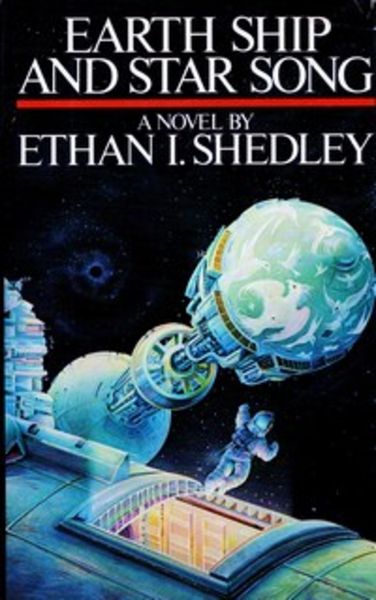How Life Goes On
Earth Ship and Star Song
By Ethan I. Shedley

24 Oct, 2021
Ethan I. Shedley’s 1979 Earth Ship and Star Song is a stand-alone science fiction novel. It was his debut novel.
Thanks to concerted efforts by many generations of humans, 21st Century Earth is clearly doomed to horrific death due to runaway greenhouse effect. When closely examined, every proposed mitigating technology has secondary effects that will accelerate the planet’s doom. Of the four possible coping mechanisms, three can be eliminated as impractical.
The best chance for the human race (and a selection of terrestrial lifeforms) is to flee the planet in great arks. The technology needed is in hand … save for one small detail.
Humanity has almost figured out a black-hole drive … but there’s some missing science. Figuring out what this might be will require a test of sufficient magnitude to destroy a star system. Since annihilating the Solar System before anyone can leave would make the effort pointless, the government dispatches a sublight ship to Alpha Centauri to carry out the final test.
There is of course a chance that Alpha Centauri has its own native population, but the computers suggest the odds of this are low. In any case, humanity’s fate is on the line. It’s only once he is well underway that pilot M’Tamba realizes the unending technical breakdowns on his ship are thanks to a powerful psychic on one of Alpha Centauri’s worlds.
Despite the moral issues and the best efforts of the alarmed alien. M’Tamba carries out his task. Humanity is saved, at the cost of every life in the Alpha Centauri system.
That would be the end of the matter, where it not for telepathy’s range. The telepathic death cry of the aliens reached across the Milky Way. There are many psychically endowed cultures in the Galaxy. All of them vow vengeance against the Terrans.
For the next four thousand years, humans are a hunted species. Ships may elude the aliens … for a time. Worlds can be transformed into new Earths … for a time. But eventually, the aliens will find their colonies and incinerate them with the focused power of pure thought! The aliens clearly have the upper hand, or so it seems.
~oOo~
Shedley is a pen name used by Boris Beizer. He appears to have been more successful in the world of software than he was in SF.
I half-remembered this book some months back and someone IDed it for me. When it turned up in one of the boxes of books, I was reshelving, it seemed destined that I read it again and see how it stood up to the test of time.
The book was, sad to say, pretty comprehensively terrible. The prose is stilted and wooden. Because the novel covers four thousand years in 221 pages, no particular era is covered in any detail. Neither are the any of the characters. This despite the fact that, thanks to some impressive cold-sleep technology, at least one 21st Century character makes it to the 62nd Century.
As one would expect in a lifeboat novel, there are occasional hat tips to eugenics. Human breeding is regulated by the 21st century. There’s a bit of a caveat, later in the book, when civil discord is triggered by someone convinced that her success as a predator proves she is a higher order of being than the common rabble. So, not humanity red in tooth and claw.
This doesn’t mean that eugenics doesn’t apply to all those persecuting psychics. The author reveals that psychic powers are often linked to harmful genes. Even if they were not, relying on them leads to self-destructive habits. In the long run, the vengeful psychics are a self-solving problem. Genocidal humanity triumphs! How convenient.
I found a few bits of this otherwise boring book interesting. The author realized that the people of the 21st Century will be boxed in by the decisions of the people of the 20th. They are left with few to no choices; we are told that just about every technology available to them is guaranteed to make Earth’s heat balance even worse (which I hope is not the case). I also liked the brief discussion of the issues inherent in selecting what skills to preserve on an ark, given that only small number of refugees can be saved.
On the whole, however, this was a dull book. Thank goodness it was also mercifully short.
Earth Ship and Star Song is out of print.
